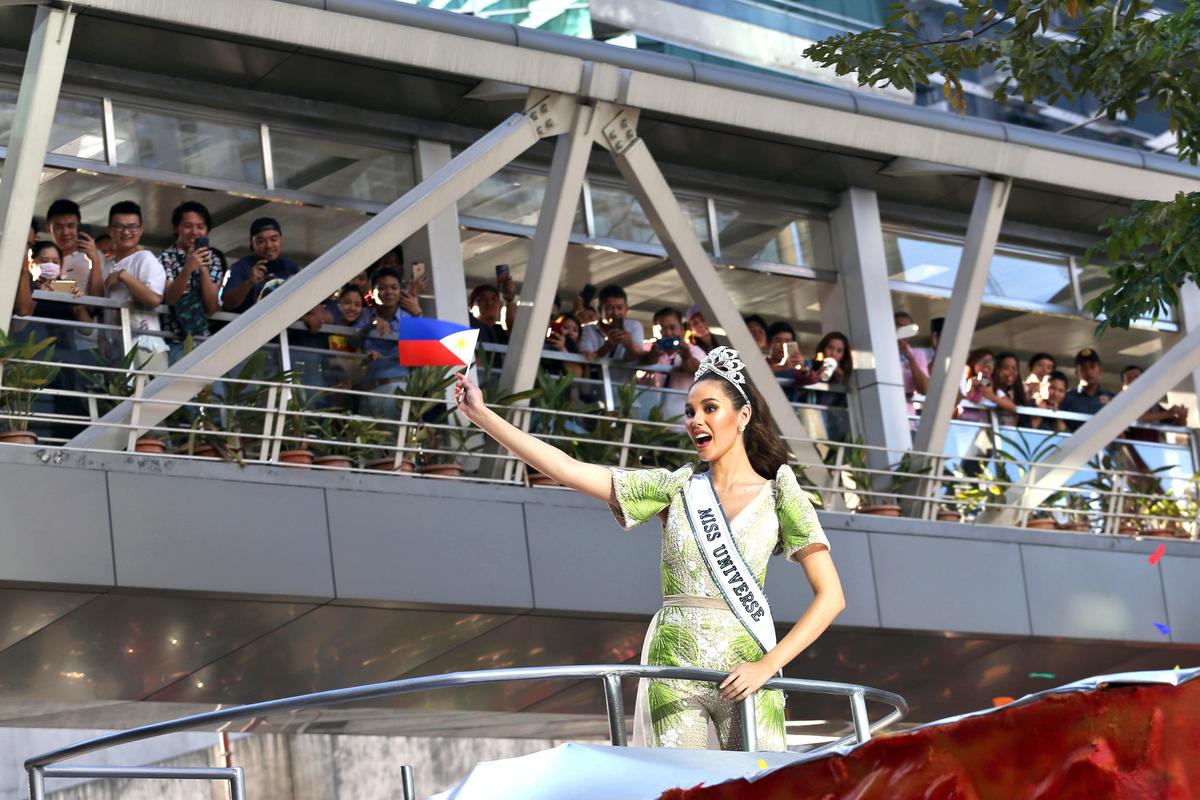In her small family home in North Manila, lulled by the crowing of roosters, Chai Nicole Bangayan proudly shows us the long ruffled pale blue dress she wore during her last beauty pageant.
The 19-year-old girl, with almond eyes and a wide smile adorned with braces, started competitions two years ago, mainly to please her parents.
“They are the ones who pushed me to participate.
They wanted me to gain confidence, and they loved seeing me on stage.
There may also have been a financial motivation,” she adds.
They had even called on a mentor to teach him how to parade and answer difficult questions.
If the young girl says she took pleasure in it, the pressure however pushed her to stop: “It was very stressful, the training, the competitions… My family wanted me to win titles, and, finally, it was a lot of expense.”
Read also »
Is the Miss France competition "has been"?
In video, the coronation of Miss Universe 2021
Chai's family aren't the only ones passionate about pageants in the Philippines.
To grasp the scale of the phenomenon, it is enough to observe the fervor of the tens of thousands of people huddled together for hours under the sun to see a lock of hair from one of their heroines, Pia Wurtzbach or Catriona Gray, after they won their Miss Universe titles.
The country has much to be proud of: it has four Miss Universe titles, one Miss World title, six Miss International titles and four Miss Earth titles.
This makes it the second most successful country, behind Venezuela, in the four most important competitions.
Beauty contests are as popular as sports or politicsRobert Requintina, editor of the daily Manila Bulletin
These victories fuel Filipinos' obsession with these competitions, "as popular as sports and politics", explains Robert Requintina, head of the entertainment section of the daily Manila Bulletin, who has spent years exclusively covering the competitions of beauty, after playing the parade himself as a child.
Each island, each municipality, each district has its competition.
They are of interest to all strata of society, from the LGBT community to the elderly, including domestic workers.
Cinderella Faye Obeñita, Miss Intercontinental 2021: "I don't come from a wealthy background, I was able to use this money to help my loved ones and pay for my studies."
@niceprintphoto
And they unleash passions, as well as international competitions: performances and results are the subject of heated debates online, “but also in homes, among friends and even in the office. And this, for days, ”says the journalist. The wrong prop can ignite the web and force a candidate to issue a public apology. Newspapers and local television stations make a big deal of it, feeding the front pages and special programs that review the outfit, preparation and romantic situation of the candidates. Even going so far as to eclipse the ceremony rewarding the first Filipina to receive the Nobel Peace Prize.
The factory of beauty
At the origin of these contests, the American colonists: "It was the colonial government which organized, in 1908, the first carnival of the Philippines, with the aim of promoting the economy of the different regions of the country", explains José Capili , professor at the University of the Philippines Diliman and co-author of an essay on the Miss.
“A beauty pageant was added on the sidelines of the event, and it was ultimately this competition (later renamed Miss Philippines) that became the main event.”
One of the local beauty camps, the Kagandahang Flores.
Hundreds of young girls train there
all day, in an almost military rhythm, forbidden to take off their 16 cm high heels.
AFP
But it was in the 1970s, under the dictatorship of President Marcos, that the competitions took on a real dimension and a political twist. “The Philippine government hosted the Miss Universe Pageant in 1974. It was then talked about everywhere in the media in order to divert attention from political and social problems. Local politicians saw this as an opportunity and began to support the organization of these contests in their constituencies in order to maintain a good image with future voters.
Its many international victories, the country does not owe it to chance.
Nicknamed the "factory of Misses", it has armed itself with real training camps which shape its future beauty queens.
A recipe borrowed from Venezuela, which attracts hand-picked competitors from all over the world: at Aces & Queens, the beauty camp that has trained many queens (like Catriona Gray), only ten chosen among hundreds of candidates participate each year in the program.
A free training, "to help young girls from modest backgrounds to change their lives and those of their families", says Gerry Diaz, director of the camp.
The Kagandahang Flores: Young women are taught to style their hair, to apply make-up, but also to answer questions, the most dreaded ordeal.
AFP
The team members are all volunteers. They do this outside of their work "out of passion and for the honor and pride that we offer our country when our Miss wins", adds Gerry Diaz. And nothing is left to chance, nor natural. On the program: hours of training to work on posture and swaying on 16 cm heels, to be kept all day.
Not to mention a fitness routine and a tailor-made diet for each.
Young women are taught to do their hair and make-up, but also to answer questions, the most dreaded ordeal according to Gerry Diaz, who is a self-proclaimed personality development coach: "I help them develop their self-confidence and have a winning spirit.
What is important, apart from the quality of their answers, is what I call facial choreography: what they say must match the expression on their face.
For performances set like music paper.
Glory and business
Many young Filipinas dream of becoming Miss because a national title offers the assurance of unique opportunities.
“For those who would like to pursue a career in cinema or television, marry an influential man or become businesswomen or political figures themselves, the Miss competitions are undoubtedly the best springboard,” explains José Capili.
In a country where one in five people lives on less than three euros a day, according to the World Bank, these competitions also keep the hope of an entire family alive.
Maureen Montagne, Miss Globe 2021.
instagram@maureenmontagne
Like that of Cinderella Faye Obeñita, Miss Intercontinental 2021: “I started the competitions when I was still a student, it was like juggling between two jobs, but my family really pushed me to get involved. I don't come from a wealthy background, so I was able to use this money to help my relatives and pay for my studies.” The story of Venus Raj is also a fairy tale: born in an isolated province, the young woman, whose only runway was the rice fields of her village, became Miss Universe in 2010. A consecration that allowed her to build a house for his whole family.
Beyond a secure career, beauty queens enjoy considerable prestige in the Philippines. Many young girls take them as a model: “They give them self-confidence, they show them how to appear in public, how to express themselves. Sometimes they are imitated in society, says Robert Requintina of the Manila Bulletin. I even have a friend who, during an interview for a teaching job, answered a question by quoting a former Miss USA. And he was accepted! On the podium erected in a ballroom in Manila on the occasion of her victory, the Miss Globe 2021, Maureen Montagne, confirms the dizzying power of her new status: "I can already see the difference, people are now listening to what I have to say. Influence is the most powerful thing an international title confers.I'm amazed at how many people want to work with me now."
These days, Misses have powerRobert Requintina
This aura is particularly evident online.
Among the most popular crowned heads, the Miss Universe 2015 and 2018, Pia Wurtzbach and Catriona Gray, are followed by nearly 13 million people on Instagram.
The crown comes with extraordinary promotional power that is redeemed through very lucrative advertising partnerships.
Their prestige also benefits the causes they defend: a message from Catriona Gray in favor of an NGO posted on Instagram, and these are nearly 40,000 euros in donations collected in the space of a few weeks.
A considerable sum in the Philippines.
power and illusions
This influence is exerted even within the political sphere. Leading Misses are invited to meet members of the government, to participate in political rallies or to appear on campaign posters. “Those whose reign is over can even receive money for their support. Lots of money,” says Gerry Diaz. “These days, Misses have power. They are free to say what they want, both on political and social issues. They influence people through their opinions,” emphasizes Robert Requintina.
Like when Catriona Gray came out in favor of the therapeutic use of marijuana. A position which, according to one of the defenders of the bill, could influence the vote of the representatives a month later. According to José Capili, this political credit is not new: “The very first Miss Philippine, Pura Villanueva Kalaw, was a suffragist. She fought for women's suffrage and won it."
Recently, the election of a young openly bisexual and non-binary woman, Beatrice Luigi Gomez, to represent the Philippines in the Miss Universe 2021 pageant, was a first in the history of the country, where 80% of the population is Catholic. and where same-sex marriage is prohibited.
If these trajectories feed the dreams of many young girls, in fact, the majority of beauty queens come from the middle or wealthy classes.
“Historically, a lot of winners came from very influential families.
It was an event to show off, ”notes José Capili.
everyday queens
Sparkling crowns, sashes and embroidered dresses are not reserved exclusively for national queens. Domestic workers are also entitled to their day of glory. Directed in 2016 by Baby Ruth Villarama, the documentary Sunday Beauty Queen honors these Filipina expatriate workers in Hong Kong who dedicate their only weekly day off to organize their own beauty contests. They thus meet on Sundays to rehearse their choreographies, work on their approaches, refine their costumes and make-up or support their favorite candidates.
Among the approximately 190,000 young women serving Hong Kong families, many find in these competitions an escape from a solitary and often difficult daily life. Some competitions reward the winners with a few hundred euros, which they can send to their families in the Philippines. Others use the profits to help struggling domestic workers. Sunday Beauty Queen first appeared in Netflix's Asia catalog in August. The consecration.
Feminist movements criticize the objectification of women through these contests, as well as the negative impact that their standards of beauty can have on the self-esteem of young girls.
Behind the scenes of this industry, the reality is not only made of glitter: “Some young women have bad encounters, people who dangle opportunities for them.
They then find themselves victims of trafficking, prostitution, fall into drugs, ”reveals Robert Requintina.
Facts of sexual harassment were denounced in particular by several candidates during the Miss World contest in Manila, in 2018. But these criticisms unfortunately have little resonance in a country where beauty is queen.
The editorial staff advises you
Miss Iceland deemed too fat in a beauty pageant
Married, especially for the worse: report in the Philippines, the country of divorce bans
Afghan women are no longer allowed to play sports, and other bans from the Taliban












/cloudfront-eu-central-1.images.arcpublishing.com/prisa/KMEYMJKESBAZBE4MRBAM4TGHIQ.jpg)


